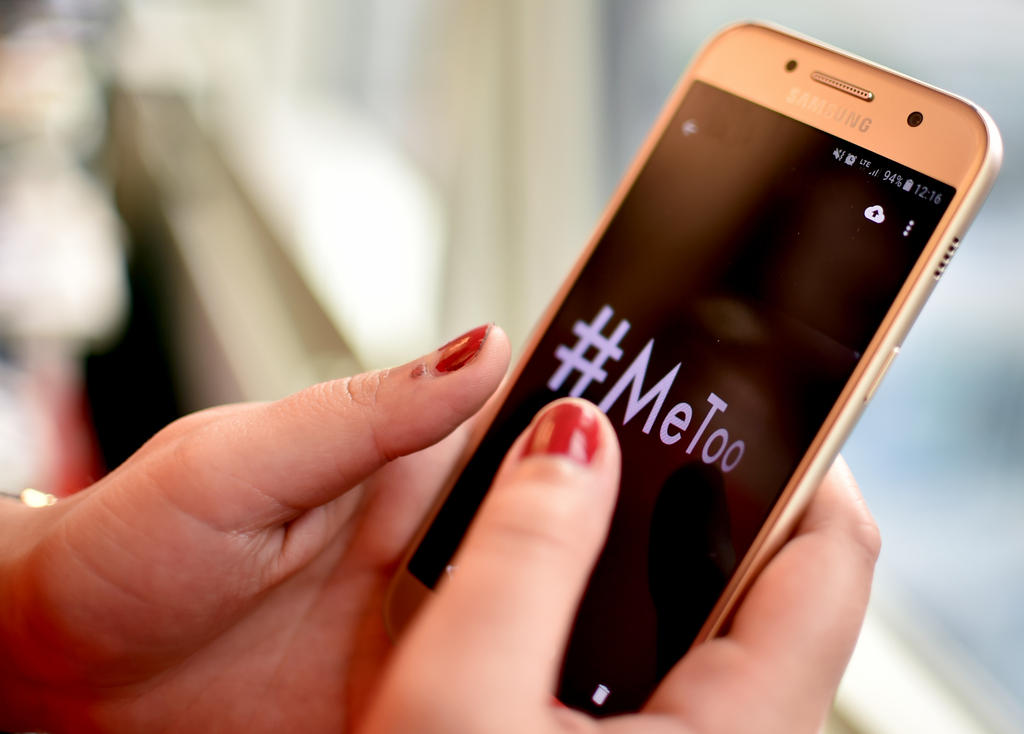What to do if sexual harassment happens to you

When allegations of inappropriate sexual behaviour by the Swiss parliamentarian Yannick Buttet emerged a few weeks ago, the discourse on sexual harassment in Switzerland shifted from could this happen here to what should we do about it.
Although a government commissioned study found that 28%External link of women in Switzerland experience sexual harassment over the course of their professional lives, rarely do these cases grab headlines in the same way the Harvey Weinstein scandal and subsequent cases have in the United States. However, the Buttet affair and recent allegations against professor Franco MorettiExternal link alongside the global #metoo social media campaign have helped bring what has largely been viewed as a private matter into the public consciousness.
What should you do if you experience sexual harassment in a workplace in Switzerland? What practical resources and legal channels are available to you and how effective are they? Swissinfo.ch answers key questions about employee rights and employer responsibilities with respect to sexual harassment in the workplace.
1. To what extent is sexual harassment a problem in Switzerland? How pervasive is it?
“It is definitely an issue here,” says Franciska Krings, professor of organisational behaviour at the University of Lausanne and co-author of a studyExternal link comparing sexual harassment across the different linguistic and cultural regions in Switzerland. According to the study and a 2008 studyExternal link commissioned by the Federal Office of Gender Equality, around half of women and men surveyed in the three linguistic areas of the country said they experienced “potentially harassing behaviours” in the workplace such as jokes, teasing, and flirting.
However, when asked if they experienced sexual harassment, the rates were strikingly different across regions and genders. Around 18% of women and less than 8% of men in Italian-speaking Ticino and French-speaking parts of the country said they did, compared with 30% of women and 11% of men in the German part. Krings explains that, “people may be more aware of the problem in the German-speaking region but it could also be that some cultures encourage women to speak up more readily”.
2. How does Swiss law define sexual harassment?
Sexual harassment is a form of discrimination based on sex and is illegal under Swiss law. The 1995 Gender Equality ActExternal link describes harassing behaviours as threats, the promise of advantages, the use of coercion and the exertion of pressure in order to obtain favours of a sexual nature. Sexist remarks, unwanted body contact, or displaying offensive material in an office could also be considered sexual harassment. What matters is not the intent of the harassing person, but how their behaviour affects the person concerned and whether it is unwanted or welcome.
When an employee is targeted and the behaviours are repeated over a period of time, the sexual harassment can be a form of bullying, referred to as mobbingExternal link, that is intended to marginalise or exclude a person in their workplace. As the University of BaselExternal link policy explains, “the main motive behind harassment has nothing to do with eroticism or sexual attraction. The sexual aspect lends itself to this kind of bullying behaviour, because it is an area where victims are especially vulnerable.”
3. What practical steps and legal actions can people living in Switzerland take if they experience sexual harassment in the workplace?
In addition to psychological and physical harm, sexual harassment can also create a hostile work environment that can affect productivity and professional growth. The University of Geneva recently launched an awareness raising campaignExternal link on sexual harassment after a 2016 study revealed that sexism was one of the major obstacles to female researchers’ career advancement.
UniaExternal link, the largest Swiss trade union, suggests that workers keep a detailed record of the harassment including the date and place it occurred. According to the Federal Office of Gender Equality guideExternal link on sexual harassment in the workplace, the first step employees should take if they are being harassed is to tell the harasser to stop. If the behaviour persists, employees should inform their supervisor, a designated contact point in the company, or a union representative.
The employee and employer may try to resolve the situation internally by shuffling job roles or mediating between employees. There is also the option to pursue a civil case against the employer, and receive compensation of up to six months of one’s salary, if the employer did not take reasonable steps to prevent harassment. Anyone experiencing rape or other forms of sexual assault should pursue a criminal case against the individual. Employees are also protected against dismissal during the duration of internal procedures, arbitration and legal proceedings.
While Swiss law provides victims of harassment with numerous protections, the reality is that rarely are cases pursued in court. A studyExternal link co-authored by Karine LempenExternal link, a law professor at the University of Geneva, found that from 2004 to 2015, there were only 35 cases of sexual harassment in the cantonal courts and only 18% of these resulted in a favourable outcome for the person who was harassed. Lempen explains that some of the key obstacles are that “the requirements for the burden of proof are very high and sexual harassment is not very well-known in the judicial system. Many courts do not investigate whether employers actually put in place appropriate preventative measures”.
Low likelihood of success after a long court case deters many people from coming forward in the first place. Many victims also feel ashamed and fear that the harasser will retaliate or that they’ll face a backlash from colleagues, especially if the accusations result in the dismissal of a well-respected, high performing colleague. Krings explains that most people end up just leaving their jobs.
To support victims, the Federal Office of Gender Equality launched an information and counselling portalExternal link in July 2017 with links to various legal and emotional support resources in the country.
4. How can and should employers respond to cases of sexual harassment in the workplace?
Swiss law requires employers to take measures to prevent sexual harassment but it does not specify what kind. As Nicole Brauchli-Jageneau of the corporate law firm VISCHER explains, most large companies in Switzerland have no-tolerance policies but they also need to be championed by senior management and socialized throughout the company. The designated contact points in the company also need to be skilled at dealing with these issues with empathy and objectivity.
Employers also need to take swift and discreet action to investigate and address cases of sexual harassment. This is a basic expectation but also essential for building a culture of trust and respect. Brauchli-Jageneau says that companies need to imagine that the “employer is likely not the first person an employee has spoken to about the harassment”. Intervening quickly and appropriately helps maintain office morale.
In November Brauchli-Jageneau co-authored a blog External linkabout the delicate balance between employers’ duty to protect all employees and the presumption of innocence. Conflicts of interest can also arise when employers are concerned about their own liability, which is why Krings recommends companies engage independent third parties to conduct an investigation.
The challenges of rooting out sexual harassment and protecting employee rights are not unique to Switzerland. Laws look good on paper but if people still fear speaking out, the wider cultural changes that are needed simply won’t happen. Brauchli-Jageneau explains that, “if you are being harassed, you are presumably not the first person and you are potentially not the last”.
Parliamentary action
Victims of sexual harassment in the Swiss parliament will be able to consult a specialised, independent advice centre from January 1, 2018, it was announced on December 13. It will be a confidential service.
The decision comes in the wake of the Yannick Buttet affair, which saw the vice-president of the centre-right Christian Democratic Party step down from his role over sexual harassment and stalking allegations. Following this, some parliamentarians spoke out about their own experiences and they and others called for more to be done in parliament.

In compliance with the JTI standards
More: SWI swissinfo.ch certified by the Journalism Trust Initiative











You can find an overview of ongoing debates with our journalists here . Please join us!
If you want to start a conversation about a topic raised in this article or want to report factual errors, email us at english@swissinfo.ch.